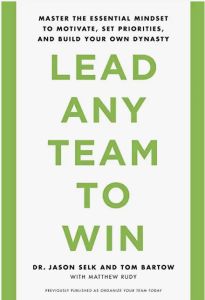Join getAbstract to access the summary!

Join getAbstract to access the summary!
Jason Selk, Tom Bartow and Matthew Rudy
Lead Any Team to Win
Master the Essential Mindset to Motivate, Set Priorities, and Build Your Own Dynasty
Da Capo Press, 2018
What's inside?
Teams are your company’s building blocks. Adopt nine strategies to make them stronger.
Recommendation
Whether you work for a giant corporation or own a company with a dozen workers, you’re part of a team. The question is, can your team achieve its goals? If it's hitting some roadblocks, authors Dr. Jason Selk and Tom Bartow (writing with journalist Matthew Rudy) can help. Selk is a performance coach for executives and professional athletes. Financial adviser Bartow is a former basketball coach. Together they offer information to help you better understand and manage the personalities on your team. The authors provide (along with great behind-the-scenes sports stories) a reliable nine-part strategy that – with work – will put your team on top.
Summary
About the Authors
Jason Selk is a performance coach for Fortune 500 executives and professional athletes in major league sports and NASCAR. Tom Bartow is a financial advisor and former college basketball coach. Golf Digest senior writer Matthew Rudy has authored or co-authored 23 golf, business and travel books.
















Comment on this summary